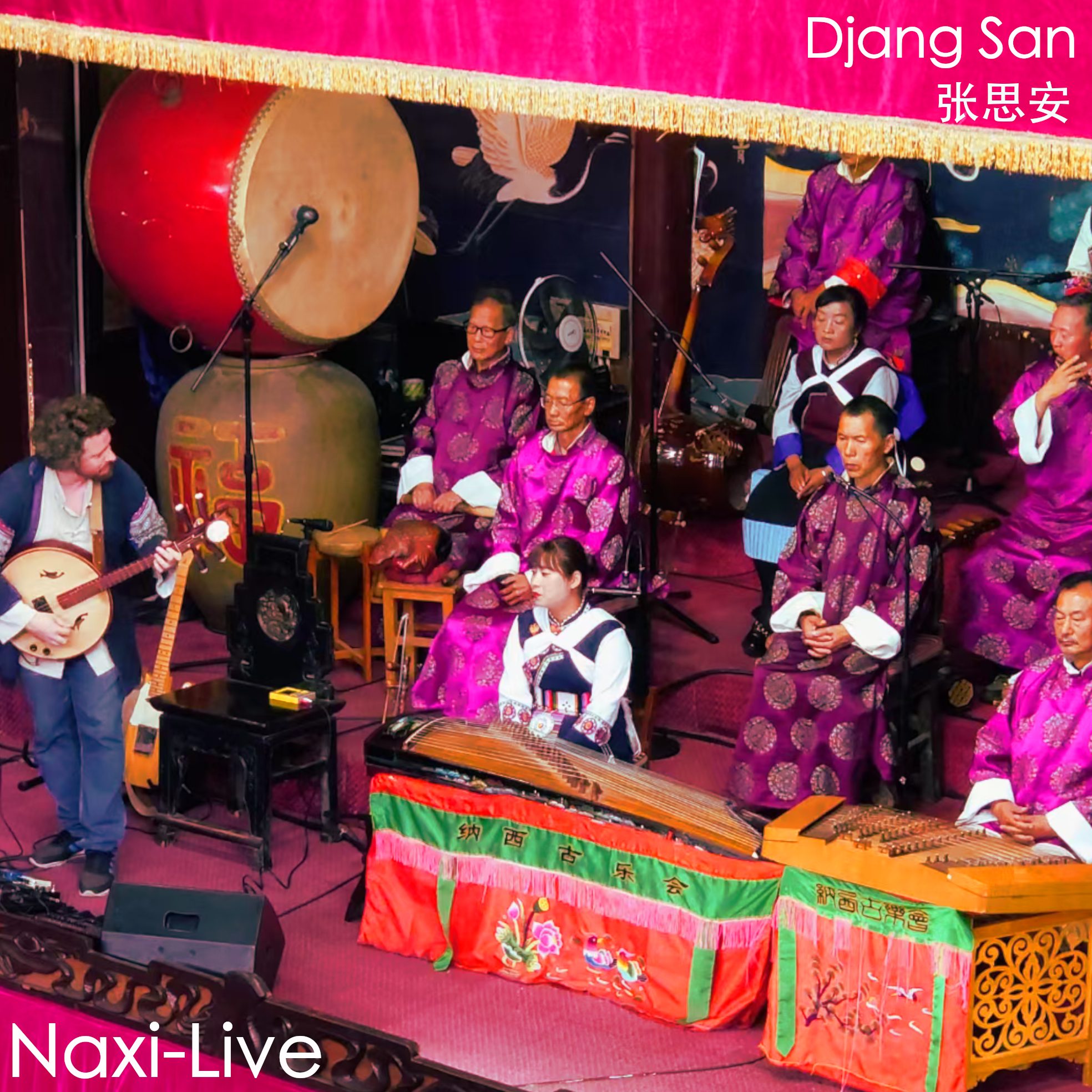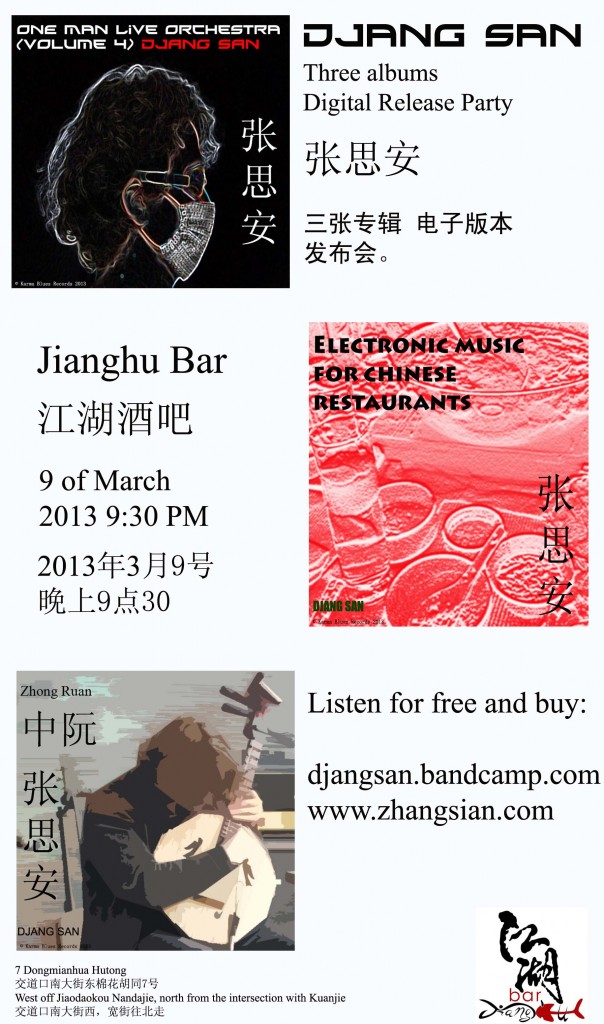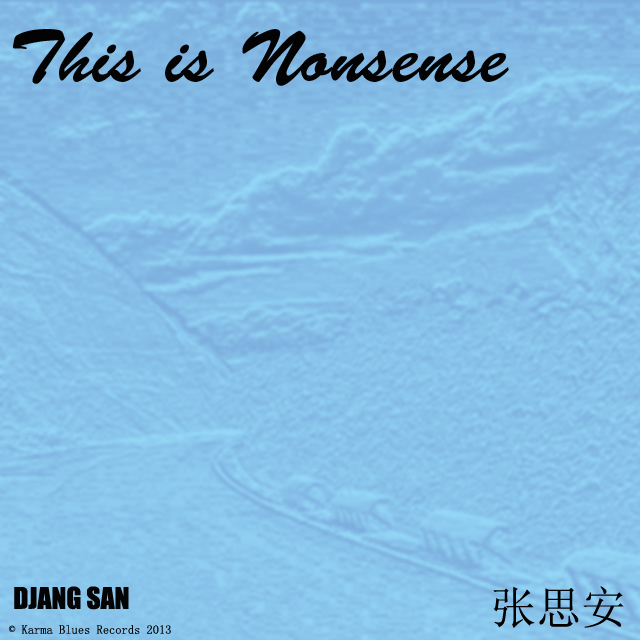Digital Albums Release Party 09/03/2013
Actually it’s not three, but 4, here is the 4th:
Listen to it here:
http://djangsan.bandcamp.com/album/this-is-nonsense
For the occasion here is an interview by Josh Feola from Smart Beijing and Pangbianr:

***
Djang San: We have played a lot this year. We are celebrating our three year anniversary on the 16th of March at 2 Kolegas, there will be surprises and DJ’s. We are playing at Sound of the Xity in Beijing on the 5th of April at Mao Livehouse and we hope to make it in more festivals this year. We want to record something but we haven’t found the right place or the right people to do it yet. Actually, if anybody reading this interview is interested to help us recording or investing in the band, or promoting the band etc…. they can contact me. We are also looking for a manager and so am I for my solo project.

AIS at the 2011 Global Battle of the Bands finals in Malaysia
Djang San: Zhang Si’an was the name I was using to play folk. When I realized that most people outside China couldn’t pronounce it right (you need to know pinyin…), I changed the name to Djang San. The name change coincided with the changes in my music, when I started to play as a one man band, started to use loop machines and mix more electronic music with folk music. On stage, I am not always experimental, I can be completely electro or folk, and sometimes I mix those three different styles together. It really depends on the mood I am in. If it’s polluted out there or if the sky is blue, the music will be completely different. As a guitarist in AIS, I still come up with most of the songs and words, but Maikel and Maomao have a bigger part in the writing and arranging process now. I am trying to push them to come [up] with more ideas and I’m also trying to make Maomao sing because he has an interesting voice and I think it would benefit the band.
Djang San: I just released 4 different albums. Electronic Music for Chinese Restaurants and This is Nonsense can be considered the same album divided in two parts. One Man Live Orchestra Vol.4 is the last volume of live recordings I have made in 2011-2013. The 4th album is a compilation of songs I have recorded over the last ten years using the Chinese instrument, zhongruan. I did this compilation because I wanted to get people to focus on that part of my music, for them to understand better what the zhongruan is as well.

One Man Live Orchestra Vol.4 and all the other live recordings have a big part that is improvised, because I get bored playing the same songs all the time and I like to explore the possibilities of the equipment and instruments I have. I think the live recordings I do are like a picture taken at a specific moment. If I play that again, it will probably sound different. As I said earlier, my mood, the weather, the environment I am in when I play mean a lot to me when I’m on stage and can influence how I play that night in various ways.
I have composed, arranged, recorded, mixed and mastered everything on the albums, apart from the two jazz covers “Summertime” and “Take the A Train,” which I obviously didn’t write.The live recordings were done by friends of mine who helped me record on the spot. Special thanks on that to Olivier and JB.
When I record at home, I don’t have much equipment, just a cheap sound card and a laptop, not even a Macintosh, as well as a shitty microphone. I wish I could use better equipment but I can’t really spend money on this these days… So in the end it all relies on what I can do with almost nothing. As the pre-amps on the sound card are not great, I go through the pre-amps of the loop pedals I use and then I modify the sound again using VST plugins in Cubase (I use Cubase 3, the other versions don’t work…). I can’t talk more about what I use, a cook never wants to reveal too many of his secrets :-).
Djang San: The truth is people can listen to the music however they want. Nowadays everybody has a laptop and listens to music through bad quality speakers. I give conditions because I think any music should be listened to properly. A lot of people tend to think that nowadays music is easy to do, that you just have to press a button and then sounds come out… well yeah, sounds come out, but it takes a lot of time to make those sounds come together, write songs, put a meaning in what you do etc… I mean, people sit down on their couch to see a movie, so why not lie down on the floor to listen to some music ?
Djang San: Well the title is ironic, the music is not specifically for Chinese restaurants…. it’s kind of a joke really. I live in Beijing, travel around in China, and at some point we all end up in restaurants eating chuan’er and drinking beer. Restaurants in China are a social space where all kinds of things happen, people sign contracts, they get drunk, meet with friends after or before Karaoke at 5 in the morning, meet women and men…. There are restaurants all over the place in China and the music on that album has a lot of different tastes and colours, like the ones there are in Chinese cuisines and restaurants.

Djang San: I started to play with electronic instruments and equipment because it opens a broader field of composition and creation for me. When I bought my first loop station a few years ago I was using it only to loop guitar, then I got bored of playing with other people and I wanted to be able to do everything by myself. Instead of finding a way to replace other musicians, I found a different way of playing alone. As a guitar player coming from rock music, I used to think that electronic music was a lot of pushing buttons and I thought most DJ’s and electro musicians were not musicians at all. I changed my mind when I started to use synthesizers, samplers and loop stations because I realized that these machines are like any other instrument, you have to practice to learn how to play it, and it doesn’t come so easy. In my opinion, the best DJ’s and electronic musicians are people who already have a solid knowledge of music. Really, it doesn’t matter what you use as long as people can rely to it.
For me, electronic music is independence. It’s a way to control everything from beginning to end without having to rely on anybody but yourself. It’s like conducting your own little orchestra. I found my own way of linking the instruments and the equipment, and I think that is the way it should be for any musician. The important [thing] for me is to always go forward, discover new ways of doing and writing music. About two years ago I started to produce my own videos, I had never done that before and I haven’t studied anything about that, but I found a way to do it and studied myself how to master a few software that allow me to do what I have in mind. In the end it is about getting to express what you want.
The project “Djang San” is a bit of everything, it’s like the result of my experience in music for the last 15 years. I don’t think it’s any particular genre, it gathers all the different music styles I have played in my life.
Djang San: I can’t release CD’s physically here, I have no support from any record company and any contacts I have had so far in the record business in China or elsewhere have led nowhere because I wasn’t satisfied by the contracts I was offered. Once again, I am open to suggestions for that matter so if anybody is interested in helping, they can contact me.
The music is already released and anybody can listen to it. Nowadays, no one will listen to music if it isn’t free, so what I do is that I put it for free streaming online and if people want to support what I do, they pay for it and download it.
Doing a release party from something I put on the Internet is a way for me to tell people to come and listen, to know about it.
Djang San: Most interviews are about musicians and bands. I want to do interviews about the people who are behind the scene, to show people what the music scene here is really about.
I also publish the interviews on my own website.
Djang San: I have heard Dice recently, and The Last Three Minutes, these two bands could have a good future if they develop in the right way. Unfortunately, the lack of money and serious promotion in the underground bands here is crippling the music.
The global trend in music in Beijing is that you basically have to rely on yourself and can’t really rely on other people. In “Music Business” you have “Business,” once you realize music is a business you realize that it’s no different than any other business. The bigger fish eats the smaller one, and a lot of talent gets destroyed or is even never considered.
There are several issues here according to me:
– I think for most people outside China, music in China is still a joke, there’s a big image problem.
– There is a tremendous gap between pop music and underground music here, and those two universes are completely separated.
– One could say there is no market for rock music and underground music in China, one might be true.
– There is no possibility for independent music to develop to a larger scale in China, except if it backed by the government or by big investors.
– It still is a lot about the guanxi and not enough about music and artistic quality.
I think there is a market for music that’s “Made in China” in the West, and there is a gap here that is asking to be filled by people who have the understanding of the two markets.
***
Djang San is having a “digital release party” for his last three albums on Saturday, March 9 at Jianghu.


